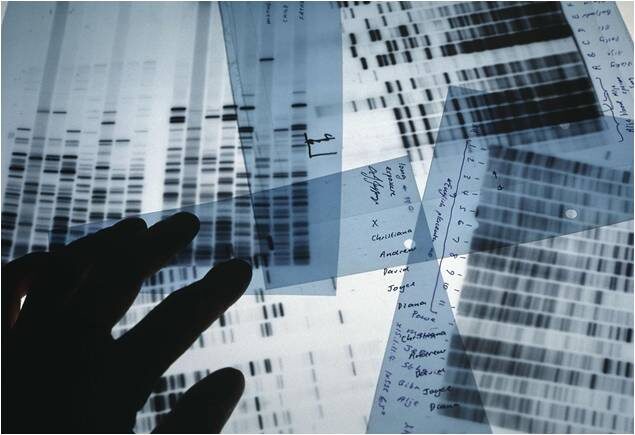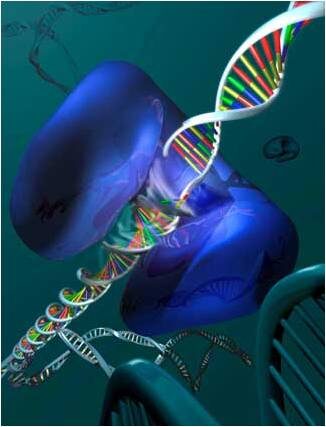Until quite recently, no completely satisfactory synthesis of the pyrimidine nucleotides has been available. The existence of a synthetic pathway has now been established (Matthew W. Powner et al., “The synthesis of activated pyrimidine ribonucleotides in prebiotically plausible conditions,” Nature 459, pp. 239–242). Questions of pre-biotic plausibility remain. Can the results of Powner et al. be reproduced without Powner et al.? It is a question that Powner raises himself: “My ultimate goal,” he has remarked, “is to get a living system (RNA) emerging from a one-pot experiment.”…
Tracey Lincoln and Gerald Joyce…began with what they needed and purified what they got until they got what they wanted.
There it is again, the intelligently designing scientist has an “ultimate goal” in mind and manipulates the experiment in hopes of getting what they wanted.
Here are more examples:
he himself [John Sutherland] solved the so-called chirality problem in origin-of-life chemistry by intelligently selecting a single enantiomer, i.e., only the righthanded sugars that life itself requires… Sutherland himself intervened to purify the chemical by-products of the previous step by removing undesirable side products. In so doing, he prevented—by his own will, intellect and experimental technique—the occurrence of interfering cross-reactions, the scourge of the pre-biotic chemist… Sutherland followed a very precise “recipe” or procedure in which he carefully selected the reagents and choreographed the order in which they were introduced into the reaction series, just as he also selected which side products to be removed and when.
Such recipes, and the actions of chemists who follow them, represent what the late Hungarian physical chemist Michael Polanyi called “profoundly informative intervention[s].” Information is being added to the chemical system as the result of the deliberative actions—the intelligent design—of the chemist himself….
The Lincoln and Joyce experiment that Falk describes approvingly does not solve this problem, at least not apart from the intelligence of Lincoln and Joyce…Lincoln and Joyce themselves intelligently arranged the matching base sequences in these RNA chains. They did the work of replication. They generated the functionally specific information that made even this limited form of replication possible…
even the capacity for partial replication of genetic information in RNA molecules results from the activity of chemists, that is, from the intelligence of the “ribozyme engineers” who design and select the features of these (partial) RNA replicators.

Lastly, note that Robert Shapiro notes that such experiments are indeed intelligently designed due to the fact that, for example, “one of the ‘assumed starting materials is quickly destroyed by other chemicals and its appearance in pure form on the early earth ‘could be considered a fantasy.’’” He also noted that, “this experimental control by researchers in a modern laboratory could have been available on the early Earth.” Also, “a pro-ID chemist” noted, “The work was very carefully done. The problem is that it was very carefully done.”
The Times Literary Supplement (TLS) proclaimed Signature in the Cell as a “book of the year” stating, in part:
[A] detailed account of the problem of how life came into existence from lifeless matter—something that had to happen before the process of biological evolution could begin…by his careful presentation of this fiendishly difficult problem.
This brought, “howls from Darwinists who made no effort to pretend they had even weighed the 611-page volume in their hand, much less read a page of it….Jerry Coyne complained that they hadn’t ought to let such an opinion even appear in the august columns of the TLS”:
“Detailed account”?? How about “religious speculation”?
Nagel is a respected philosopher who’s made big contributions to several areas of philosophy, and this is inexplicable, at least to me. I have already called this to the attention of the TLS, just so they know. No doubt the editors appreciated his letting them know they had erred by printing a view not in line with the official catechism. Coyne then appealed for help. Not having read the book himself, while nevertheless feeling comfortable dismissing it as “religious speculation,” he pleaded:
Do any of you know of critiques of Meyer’s book written by scientists? I haven’t been able to find any on the Internet…
John C. Walton wrote:
It is an amusing irony that while castigating students of religion for believing in the supernatural, [Fletcher] offers in its place an entirely
imaginary “RNA world” the only support for which is speculation!
Are you noticing a pattern here at all? All the people who hate Meyer’s book appear not to have read it. So too we have the complaint of Darwinian-atheist agitator P. Z. Myers, a popular blogger and biologist. Myers explains that he was unable to read the book, which he slimes as a “stinker” and as “drivel,” due to his not having received a promised free review copy! But rest assured. The check is in the mail: “I suppose I’ll have to read that 600 page pile of slop sometime…”…
So you know when he evaluates a book and calls it “slop,” a book on which he has not laid on eye, that’s a view that carries weight. In all seriousness, what is this with people having any opinion at all of a book that, allow me to repeat, they haven’t read and of which, as with Jerry Coyne, they admit they haven’t so much as read a review?….
P.Z. Myers directed readers of his heavily trafficked blog to a call for negative reviews of Signature—while simultaneously declaring, “I suppose I’ll have to read that 600-page pile of slop sometime…”…
Seeing that their leader was publicly attacking a book he hadn’t read, P.Z.’s fans felt justified in doing the same. Amazon.com saw a sudden spike in short, negative one-star reviews of Signature in the Cell that had little to do with any of the arguments in the book….P. Z. Myers caricatured the book by stating, “I know what is in this book—’ooooh, it’s so complex, it must have been . . . designed!’”

PZ Myers ended up “calling Signature in the Cell ‘Discovery Institute Bulldung,’ and proclaiming that “Stephen Meyer lies.”… While readers of P. Z.’s blog generally cheer on his every invective.” Sadly, expecting maturity and integrity from PZ Myers is sort of like…well…it is sort of like expecting maturity and integrity from PZ Myers.
This, by the way, is the same—positive-affirmation-of-God’s-non-existence-without-evidence-atheist—PZ Myers who stated that atheism and science are “inseparable.”
This, by the way, is the same PZ Myers who critiqued Vox Day’s book The Irrational Atheist: Dissecting the Unholy Trinity of Dawkins, Harris, and Hitchens having, at least, read parts of it. Yet, subsequently, and repeatedly, he has refused to debate Vox Day on the issue of evolution or God’s existence for that matter and has done so, repeatedly, via a barrage of childish and abusive ad hominems (see Speaking of Assiduous Absconders…Yet Again, Vox Day Challenges PZ Myers to Debate).
PZ Myers did hit one nail on the head by admitting that even though he had not read the book upon which he was commenting, “I know what is in this book—’ooooh, it’s so complex, it must have been . . . designed!’” Well stated indeed professor!
If you ever actually listen to or read Intelligent Design proponents you will note that they are constantly begging the media, their opponents and children of all ages to stop misrepresenting and mischaracterizing Intelligent Design as being the position that it’s so complex that goddidit or some such wordage. Thus, PZ Myers proves why such misrepresentations and mischaracterizations continue unabated by evidence or pleas.
Chris Mooney likewise discredits himself by claiming that Stephen Meyer “throws up his hands, and says, it’s so improbable, God must have done it.”
Jerry Coyne joined the club as well:
Isn’t it strange, though, that for all the persistent attacks on Meyer, in quite personal terms, Professor [Jerry] Coyne hasn’t dared to actually read Steve’s book? That’s obvious because Coyne’s throwaway summary of its contents—Signature “maintains that cells must have been designed by God because they’re too complex to have evolved”—is an absurd misrepresentation. Even someone who had only read reviews of the book would know as much…This is the same Dr. Coyne who earlier characterized Steve Meyer as a “young-earth creationist,” which of course he’s not.
Also, much like PZ Myers, a commenter responded to a belligerent statement written by Jerry Coyne by stating, “Meyer seems like a lot of things—including smart—but I don’t think he is a deliberate liar…” and yet, another “reviewer” wrote, “The question is settled, and attempts to keep
pursuing it are just lies from the ‘Dishonesty Institute.’”
But why is it misrepresenting and mischaracterizing to refer to Intelligent Design in general and Stephen Meyer in general as arguing it’s so complex that goddidit? Stephen Meyer’s argument is, in part, that:
intelligent agents have demonstrated the capacity to produce large amounts of functionally specified information (especially in a digital form). Second, no undirected chemical process has demonstrated this power. Hence, intelligent design provides the best—most causally adequate—explanation for the origin of the information necessary to produce the first life from simpler non-living chemicals. In other words, intelligent design is the only explanation that cites a cause known to have the capacity to produce the key effect in question.
